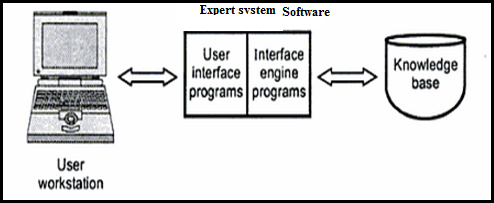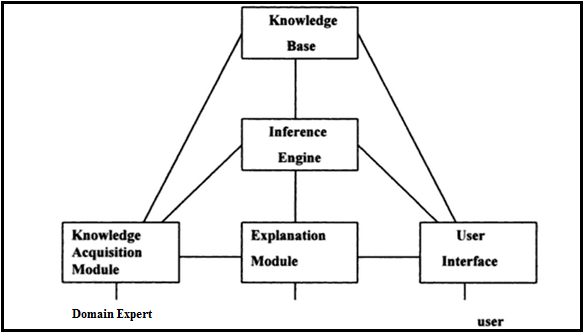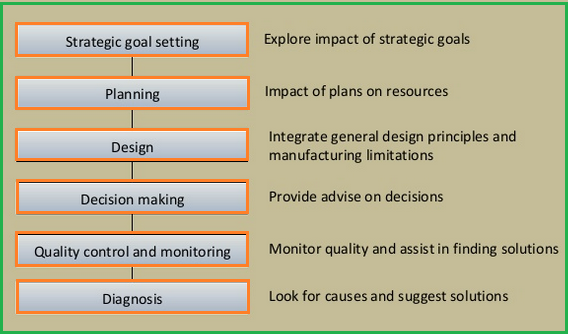Expert Systems
Expert system is the type of information system that facilitates the computer to make suggestions and function like an expert in a particular field, helping to enhance the performance of the beginner user. It is basically is a knowledge-based information system, that is, it uses its knowledge about a specific area to act as an expert consultant to users. Expert system is branch of Artificial Intelligence which deals with helping Non-Expert to find solution to complex problem in a more Expert-Like fashion. The exceptional value of expert systems is that they permit organizations to capture and use the understanding of experts and specialists. Therefore, rich experience and specific skills are not totally lost when a human expert dies, retires, or leaves for another job. For example, The U.S. Army uses the Knowledge and Information Fusion Exchange (KnIFE) expert system to support soldiers in the field to make better military decisions based on successful decisions made in earlier military engagements. The collection of data, rules, procedures, and relationships that must be followed to accomplish value or the proper outcome is contained in the knowledge base of expert system.
An expert system is a software system that integrates concepts derived from experts in a field and uses their knowledge to provide problem analysis to users of the software. Expert systems are basically computer applications that conglomerate computer equipment, software, and specialized information to imitate expert human reasoning and advice. It is a branch of artificial intelligence that provide discipline-specific advice and explanation to their users. Expert systems function is best with specific activities or problems and a discrete database of digitized facts, rules, cases, and models. Expert systems has broad application in the area of commercial and industrial settings, including medicine, finance, manufacturing, and sales. In an expert system development process, knowledge is critical.
There are some key studies about knowledge throughout the expert system literature. Wu et al. (2000) asserted that a critical factor that affects knowledge-based systems' performance and reliability is the quantity and quality of the knowledge bases. During their study they discuss that many knowledge acquisition tools have been developed to support knowledge base development. Likewise, Cheung et al. (2004) offered an agent-oriented and knowledge-based system for strategic e-procurement. The system has been designed to capture and leverage the knowledge of an enterprise to generate dynamic business rules by which an effective procurement strategy can be generated based on enterprise needs and the analysis of relevant market conditions. Other management theorists like Diamantidis and Giakoumakis (1999) present a tool that combines two main trends of knowledge base refinement. The first is the construction of interactive knowledge acquisition tools and second is the development of machine learning methods that automates this procedure. The procedure they present gives experts to evaluate an expert system.
Expert system comprises of four main components that include (Bagad, 2009):
- A user interface
- A knowledge base
- An interface engine
- A development Engine

General type of expert system is a computer program, with a set of rules that analyses information (usually supplied by the user of the system) about special type of problems, and recommends one or more courses of user action. The expert system may also provide mathematical analysis of the problem(s). The expert system utilizes what appears to be reasoning capabilities to reach conclusions. As a software program, the expert system incorporates a searching and sorting program with a knowledge database. The particular searching and sorting program for an expert system is called the inference engine. The inference engine contains all the systematic processing rules and logic associated with the problem or task at hand. Mathematical probabilities often serve as the basis for many expert systems.
The second component the knowledge database stores required factual, procedural, and experiential information representing expert knowledge. Through a procedure of knowledge transfer, expertise (or those skills and knowledge that sustain a much better than average performance) passes from human expert to knowledge engineer. The knowledge engineer actually creates and structures the knowledge database by completing certain logical, physical, and psychosocial tasks. In this reference, expert systems are called knowledge-based information systems. Through distributing human expertise, businesses can get success in consistency, accuracy, and reliability in problem-solving activities. Knowledge base is a natural extension of database and information and decision support system.
Source: George Reynolds, 2008)
Four interactive roles form the activities of the expert system:
- Diagnosing
- Interpreting
- Predicting
- Instructing
The systems undertake each of components by applying rules and logic specified by the human expert during system creation or maintenance or determined by the system itself based on analysis of historical precedents. Instruction emerges as a result of the expert system's justification system. Synthesizing feedback with various combinations of diagnostic, interpretative and predictive programme, the expert system can become a finely tuned personal tutor. Computer-aided instruction (CAI) succeeds as a field of inquiry and development for businesses.
Early models: In historical review, it is documented that initially expert systems appeared in the mid-1960s as an outgrowth of research in artificial intelligence. Expert system take their roots in Cognitive Science that is the study of human mind using combination of AI and psychology. Expert systems were the first successful applications of artificial intelligence to real–world problems solving in medicine, chemistry, finance and even in space (Space Shuttle, robots on other planets). The first noteworthy expert system was DENDRAL. It was developed at Standford University in 1960s. DENDRAL was designed to infer the structure of organic molecule from their chemical formulas and information obtained by mass spectroscopy about the chemical bond present in molecules. DENDRAL applied heuristic knowledge to large search space (Biondo, 1990).
Many early systems such as GPPS, XCON at Digital Equipment Corp., and CATS-1 at General Electric pioneered the idea of a computer expert. But one, MYCIN, most clearly introduced two essential features of an expert system: modularity and justification. MYCIN was developed at Stanford University as an expert system to support in the diagnosis of bacterial meningitis. As it was developed, MYCIN emerged as a product of modular design with a facility to explain its own advice.
Building a knowledge base: The elementary role of an expert system is to reproduce a human expert and replace him or her in a problem-solving activity. To perform this activity, important information must be transferred from a human expert into the knowledge database and, when appropriate, the inference engine. Two different types of knowledge emerge from the human expert which is facts and procedural or heuristic information. Major facts incorporate the definitively known data and the defined variables that comprise any given activity. Procedures capture the if-then logic the expert would use in any given activity. Through a formal knowledge attainment process that includes identification, conceptualization, formalization, implementation, and testing, expert databases are developed. Interviews, transactional tracking, observation, case study, and self-reporting choices are common means of extracting information from a human expert. Using programmatic and physical integration of logic, data, and choice, expert systems integrate the examination and interpretation of data input with specific rules of behaviour and facts to arrive at a suggested result.
Architecture of good expert system (Source: Nikolopoulos, 1997)
There are many ways that knowledge is represented in expert systems:
- Case-based reasoning: Representing knowledge in an expert system's knowledge base in the form of cases.
- Frame-based knowledge: Knowledge denoted in the form of a hierarchy or network of frames. A frame is a collection of knowledge about an entity consisting of a complex package of data values describing its features.
- Object-based knowledge: Knowledge represented as a network of objects. An object is a data element that includes both data and the methods or processes that act on those data.
- Rule-based knowledge: Knowledge represented in the form of rules and statements of fact. Rules are statements that typically take the form of a premise and a conclusion such as: IF (condition), Then (conclusion).
- Software resources: An expert system software package contain an inference engine and other programs for refining knowledge and communicating with users. The inference engine program processes the knowledge (such as rules and facts) related to a specific problem. It then makes associations and inferences resulting in recommended courses of action for a user. User interface programs for communicating with end-users are also needed, including an explanation program to explain the reasoning process to a user if requested.
Capabilities of expert system include Strategic goal setting, Explore impact of strategic goals, Planning Impact of plans on resources, Integrate general design principles and Design manufacturing. Expert system offer unique capabilities as decision support system.
capabilities of expert system:
Application of Expert Systems
Expert systems are specially designed and develop to support the activities in the fields of accounting, medicine, process control, financial service, production, human resources. Indeed, the foundation of a successful expert system depends on a series of technical procedures and development that may be designed by certain technicians and related experts. While expert systems have renowned themselves in artificial intelligence research to explore practical application, their application has been restricted. In today's business world, the use of expert system is rising. The most significant challenge of expert system is to integrate expert system concepts and functions into existing applications. The application of experts system are many that include security, capacity planning for information system, military analysis, construction of maps and law enforcement (Shim, 2002). Expert systems support in diagnosis of illness, search minerals, analyse compounds, recommend repairs, and do financial planning. From strategic business perspective, expert systems are used to improve every step of the product cycle of a business, from finding customers to shipping products to providing customer service. Expert system provides a cost reduced solution, consistent advice with low level of errors, solution to handle equipment without the interference of human.
Benefits and costs: Expert systems capture rare expert knowledge and reduce it archival. This is an advantage when losing the expert would be a significant loss to the organization. Distributing the expert knowledge improves employee productivity by offering necessary assistance to make the best decision. Improvements in reliability and quality normally appear when expert systems distribute expert advice, opinion, and explanation on demand. Expert systems are well versed in dealing complex tasks and activities as well as an extremely rich knowledge-database structure and content. As such, they are suitable to model human activities and problems. Expert systems can decrease production downtime and, as a result, increase in output and quality. Furthermore, expert systems enable the transfer of expertise to remote locations using digital communications. In specific situations, ongoing use of an expert system may be cheaper and more consistent than the services of a human expert.
The costs of expert systems differ significantly and often include post-development costs such as training and maintenance. For large companies and complex activities, sufficiently powerful computer hardware must be available, and frequently programming must be done to integrate the new expert system with existing information systems and process controls. Additionally, depending on the application, the knowledge database must be modernised frequently to maintain relevance and timeliness. Increased costs may also appear with the identification and employment of a human expert or a series of experts. Retaining an expert involves the potentially expensive task of transferring expertise to a digital format. Depending on the expert's ability to apprehend and digitally represent knowledge, this process may be overlong. Some expert systems fail to recover their costs because of poor design or inadequate knowledge modelling.
Basically, expert system is beneficial as it provides consistent answers for repetitive decisions, processes and tasks, holds and maintains significant levels of information, encourages organizations to clarify the logic of their decision-making.
Disadvantages of expert system: Major disadvantages of expert system include lack of common sense needed in some decision making, cannot make creative responses as human expert would in unusual circumstances, domain experts are not always able to clarify their logic and reasoning. Errors may occur in the knowledge base, and lead to wrong decisions. Expert system cannot adapt to changing environments, unless knowledge base is changed.
Reviewing the management explanation of this system, it is well established that Expert systems are highly important to organizations that have good know-how experience and expertise that cannot be easily transferred to other members. They are designed to transmit the intelligence and information found in the intellect of experts and provide this knowledge to other members of the organization for problem solving purposes. Generally, expert systems are used for problems for which there is no single "correct" solution which can be encoded in a conventional algorithm. One would not write an expert system to find direct paths through graphs, or sort data, as there are simply easier ways to do these tasks. Simple systems use simple true/false logic to evaluate data. More sophisticated systems are capable of performing at least some evaluation, taking into account real-world uncertainties, using such methods as fuzzy logic.
To summarise, an expert system is a knowledge based information system. It uses its knowledge as an expert consultant. Main components of expert system are knowledge base and software modules. It is well documented in management studies that expert system is an intelligent computer program that can perform special and difficult task in various fields at the level of human experts. When competently developed, expert system can run by people who have virtually no computer experience. The expert system ask the user a series of questions. After the user's answer of the system generated questions, the experts system generates conclusions.

